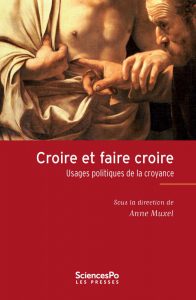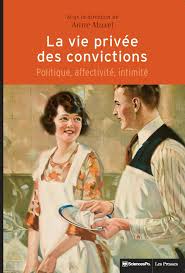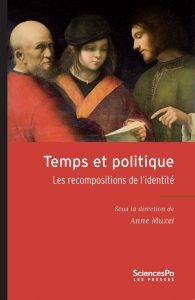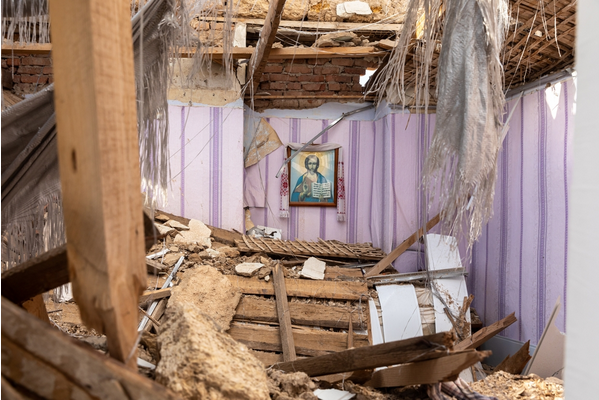


The integration of ethnic and immigrant minorities: sharing knowledge
3 April 2018
The Effects of Economic Conditions on the Sorting of Jobs and Workers
6 April 2018 One would think that the era of beliefs has passed in our societies, which are steeped in secularism and weary of ideologies. Such is not the case. Under new forms and through new avenues, believing and making others believe remain vibrant. This phenomenon is described and explained in the collective work “Croire et faire croire. Usages politiques de la croyance” [Believing and making others believe. Political uses of faith], edited by Anne Muxel, researcher at Sciences Po’s Center for Political Research (CEVIPOF). Through a collection of contributions it sheds light on the new terms, areas and uses of belief. Interview.
One would think that the era of beliefs has passed in our societies, which are steeped in secularism and weary of ideologies. Such is not the case. Under new forms and through new avenues, believing and making others believe remain vibrant. This phenomenon is described and explained in the collective work “Croire et faire croire. Usages politiques de la croyance” [Believing and making others believe. Political uses of faith], edited by Anne Muxel, researcher at Sciences Po’s Center for Political Research (CEVIPOF). Through a collection of contributions it sheds light on the new terms, areas and uses of belief. Interview.
What is a belief? Do people still believe in today’s France?
Anne Muxel – Belief is a matrix through which mentalities and representations of a society at a given moment of its history develop. It expresses the repertoire of senses and the mental maps that individuals use to find their bearings in the social and political world. Belief has several dimensions: it is a mechanism that feeds and articulates the capacity to believe and make others believe, but it also involves certainty and doubt as forces of subversion. To dispense with belief is not realistic, let alone possible. French society is certainly among the most secular in Europe, but beliefs have not disappeared – far from it. They are increasingly fragmented and compartmentalized, however. They are expressed through a mosaic of references, models and purposes. Even collective beliefs – for example, the relationship to ideologies and values such as human rights – have become more particularized and individualized.
Your book draws on fields like literature and visual arts (cinema, painting). How is the merging of these disciplines with the social sciences and humanities fruitful?
 A.M – This book seeks to shed light on the changes and reconfigurations of belief on the basis of diverse perspectives. Belief operates in all areas of social life, from family to politics, encompassing private, religious and cultural choices. The chapters are wide-ranging, exploring the representation of prayer in the history of painting, ways of staging power in film, the difficulty that the children of collaborators have dealing with the beliefs of their parents, and the perspectives of mothers on their children’s jihadist involvement.
A.M – This book seeks to shed light on the changes and reconfigurations of belief on the basis of diverse perspectives. Belief operates in all areas of social life, from family to politics, encompassing private, religious and cultural choices. The chapters are wide-ranging, exploring the representation of prayer in the history of painting, ways of staging power in film, the difficulty that the children of collaborators have dealing with the beliefs of their parents, and the perspectives of mothers on their children’s jihadist involvement.
You show a link between belief and politics….
A.M –A number of contributions reveal a proliferation of institutions of belief, and therefore of beliefs, that goes hand in hand with a weakening of belief in politics. For example, the new forms of populism that have emerged as established political ideologies have declined, promote a weak and eclectic ideology that can respond to various frustrations and identity malaises. No surprise that populism especially draws young generations.
 How would you position this book in relation to the two preceding works you edited: “La vie privée des convictions” [The private life of convictions] and “Temps et politique. Les recompositions de l’identité” [Time and politics. Reconfiguring identity]?
How would you position this book in relation to the two preceding works you edited: “La vie privée des convictions” [The private life of convictions] and “Temps et politique. Les recompositions de l’identité” [Time and politics. Reconfiguring identity]?
These three books form a series resulting from work on the subject of “Politics, affectivity and intimacy” that I have been pursuing over the past five years. The goal was to expand certain political science inquiries by drawing on disciplines like history, psychoanalysis, philosophy, literature and cinema, and to study the construction of political identities, the temporality and sustainability of involvement, and the end of ideologies, from underexplored perspectives. “La vie privée des convictions” analyzes links between the private sphere and the public sphere, to what I have called the “intimate politicization” of individuals.  We demonstrated that everyone develops their choices on the basis of criteria derived from notions of resemblance and proximity. This turns the private sphere into an integral field in the democratic adventure. “Temps et politique. Les recompositions de l’identité” looked at the reconfigurations of political identities and the impact of historical, social and biographical temporalities on the relationship to politics. It provided a fresh perspective on how politics is shaped by time, be it the collective time of generations or the more intimate time of life stages. “Croire et faire croire” concludes this series by tackling the bedrock of social and political order: belief..
We demonstrated that everyone develops their choices on the basis of criteria derived from notions of resemblance and proximity. This turns the private sphere into an integral field in the democratic adventure. “Temps et politique. Les recompositions de l’identité” looked at the reconfigurations of political identities and the impact of historical, social and biographical temporalities on the relationship to politics. It provided a fresh perspective on how politics is shaped by time, be it the collective time of generations or the more intimate time of life stages. “Croire et faire croire” concludes this series by tackling the bedrock of social and political order: belief..
Anne Muxel is a Research Director at the Centre for Political Research at Sciences Po (CEVIPOF) where she specialises in electoral and political behaviour, abstentionism, etc. She focuses on the younger generations and more specifically their attitudes to and relationship with politics.



